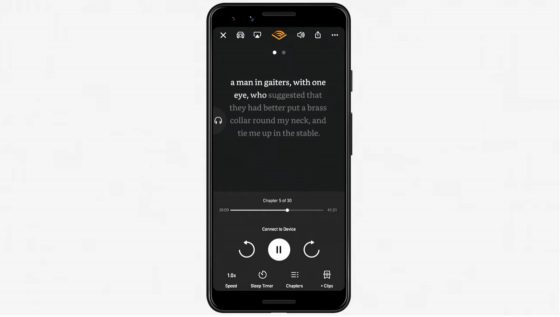Last month Audible revealed an upcoming new Audible Captions feature that gives Audible app users the option to read along with audiobooks as they’re read aloud.
Basically the app adds computer-generated captions to audiobooks to allow reading while listening, but before the feature has even been released to the public, book publishers have filed a lawsuit against Audible to try and put a stop to it on grounds that Audible doesn’t have the rights to distribute audiobooks in text form.
All Big Five major publishers are onboard with the lawsuit.
Here’s a quote from The Verge with the reasoning behind the complaint:
“Audible Captions takes publishers’ proprietary audiobooks, converts the narration into unauthorized text, and distributes the entire text of these ‘new’ digital books to Audible’s customers,” the lawsuit reads. “Audible’s actions — taking copyrighted works and repurposing them for its own benefit without permission — are the kind of quintessential infringement that the Copyright Act directly forbids.”
Audible is marketing the feature as a learning tool for students, and they claim that the computer-generated text isn’t the same as a book because of limitations on how the feature can be used.
Here’s Audible’s take on the situation:
“We are surprised and disappointed by this action and any implication that we have not been speaking and working with publishers about this feature, which has not yet launched. Captions was developed because we, like so many leading educators and parents, want to help kids who are not reading engage more through listening. This feature would allow such listeners to follow along with a few lines of machine-generated text as they listen to the audio performance. It is not and was never intended to be a book. We disagree with the claims that this violates any rights and look forward to working with publishers and members of the professional creative community to help them better understand the educational and accessibility benefits of this innovation.”
Basically it’s the whole text-to-speech controversy all over again back when Amazon started offering text-to-speech on Kindle ebook readers. Except now it’s the opposite, where the fight is against speech-to-text. Ultimately it’ll probably work out the same as the TTS thing did, where publishers and authors have the choice to allow the feature or not.
See here for more about Audible Captions over on Audible’s website.
via: The Verge


thanks for the update.
some authors are not jerks, and give you a free ebook with your audible purchase (or vise-versa). hopefully more will do this. if audible added a badge to indicate an ebook is included, it would bring attention, and people would pressure authors to be more generous (or just price it in).
caring as we all do about young people, some having severe learning disabilities, the feature audible was rolling out was to be a real boon, an entire library of books with karaoke-like text. what a shame, an anti-literacy campaign by publishers!
As the article said, this is a publisher lawsuit, not an author one. Authors who signed contracts giving all their rights to their publisher probably have no say whether they get dragged into this. Publishers (non-Indie ones, at least) tend to be very out-of-touch with the modern market and are running scared trying to protect every little bit of turf they still have. They still have solid legal teams, though, although picking on a company with Amazon’s resources behind them will not be a walkover case.
thanks, Benjamin. so this whole thing is due to authors not fighting publishers. or maybe i’m foolishly dreaming of a literary “me too”.
This is like arguing that closed captions on TV make a book out of what is on the screen. It doesn’t. Are they really concerned that people won’t buy the book because they can read a few lines at a time while following the audiobook?
Did people stop buying audiobooks because TTS could read an ebook aloud? Judging by the declining sales of ebooks and increasing sales of audiobooks, I believe those fears were unfounded.
If anything, this will increase audiobook sales, which just so happen cost more than digiprint and physiprint book on average.
I use ebooks, Audible and text to speech. As long as the author gets paid who cares.
I cannot see any real case why test-over-speech would cause any harm for publishers or authors. From other side, it’s a great addition not only for young people but also for language learners who avoid to buy audiobooks without “closed captions”.